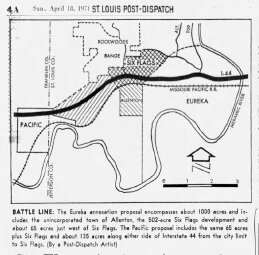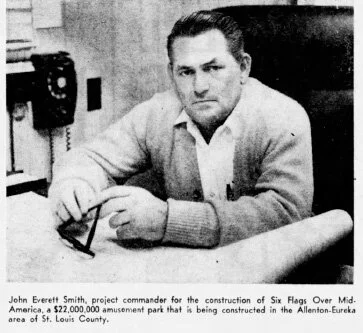Angus Wynne’s third and final original park in his growing chain would be located just west of the mighty Mississippi. Nestled between the sleepy towns of Allenton, Pacific, and Eureka, 502 acres had been optioned just off I-44, sparking the usual debate among locals. Many opposed the great change that would inevitably sweep their quiet way of life; others were wildly enthusiastic, particularly the local officials of these small communities who had visions of tax dollars dancing in their eyes.
The company itself was in turmoil. Angus had sold Great Southwest Corporation, including his Six Flags park division, to the Pennsylvania Railroad. The once-powerful PRR had since merged into what was now called Penn Central, and major financial issues were threatening to derail everything. In spite of all this they managed to get Mid-America opened on June 5, 1971. The park’s design is noticeably different from their first two properties; Angus considered Randal Duell’s work on Astroworld too close of a competitor to Six Flags Over Texas and therefore went a different route in Missouri. Most obvious of the change is the lack of a clear Duell loop, the characteristic pathway Randall’s designers had begun to perfect that guides visitors around the park, ensuring they don’t miss a thing. In spite of a different approach, the park had lots of regional touches and was successful from day one.
Mid-America would be the last park Six Flags designed from scratch; from then on each owner of the company would seek out existing properties to purchase and rebrand. Here are several newspaper clippings of ads, early aerials of the property and site maps, and even a shot of the construction manager who also oversaw getting the Georgia park built.













